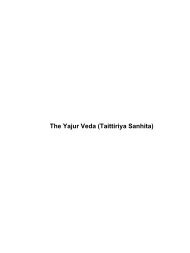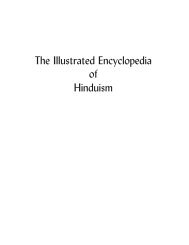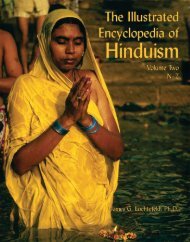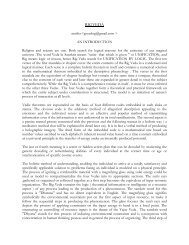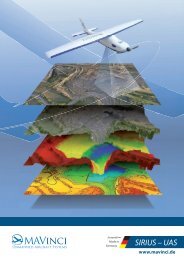A Concise Encyclopedia of Hinduism Klaus K Klostermaie
You also want an ePaper? Increase the reach of your titles
YUMPU automatically turns print PDFs into web optimized ePapers that Google loves.
45 Burnouf, Eugéne<br />
an enlightened one, he first approached<br />
his former companions in a grove near<br />
Väräæasï to announce to them the good<br />
news <strong>of</strong> the finding <strong>of</strong> deathlessness and<br />
freedom from suffering. It was only in<br />
the course <strong>of</strong> time that Buddha’s teaching,<br />
which de-emphasized caste and ritual,<br />
and taught liberation through an ethical<br />
life and meditation only, was considered<br />
heterodox and his followers were<br />
deemed outside the Hindu community.<br />
In later centuries, when Buddhism<br />
became the predominant religion in<br />
India, Hindus considered it (together<br />
with JAINISM) the paradigm <strong>of</strong> a nästika<br />
(heterodox) system, a DARŸANA (2) that<br />
did not recognize the Veda as supreme<br />
authority and precluded membership in<br />
SANÄTANA DHAØMA. From the eighth century<br />
CE onwards, beginning with<br />
Kumärila Bhaflfla’s Ÿlokavärttika, a major<br />
Hindu polemic against Buddhism developed,<br />
which found expression in hundreds<br />
<strong>of</strong> literary works as well as<br />
in the occasional persecution <strong>of</strong><br />
Buddhists. In modern India there is a tendency<br />
to consider Buddhism as one <strong>of</strong> the<br />
forms <strong>of</strong> Indian religiosity that in course<br />
<strong>of</strong> time was reabsorbed by <strong>Hinduism</strong>.<br />
budha (‘wise, intelligent’)<br />
The planet Mercury; son <strong>of</strong> Soma (moon),<br />
by TÄRÄ (star), wife <strong>of</strong> BØHASPATI.<br />
Bühler, Georg (1837–98)<br />
A gifted linguist (he studied Latin, Greek,<br />
Arabic, Persian, Zend, Armenian and<br />
Sanskrit), he spent many years in India as<br />
pr<strong>of</strong>essor <strong>of</strong> oriental languages at<br />
Elphinstone College, Bombay, and was<br />
<strong>of</strong>ficially entrusted with the collection <strong>of</strong><br />
Sanskrit manuscripts in the Bombay<br />
Presidency. He produced valuable catalogues<br />
<strong>of</strong> manuscripts, edited texts and<br />
produced translations <strong>of</strong> Sanskrit and<br />
Prakrit texts. He specialized in Indian<br />
law and contributed a translation <strong>of</strong> the<br />
MANU-SMØTI with an extensive introduction<br />
<strong>of</strong> his own to the Sacred Books<br />
<strong>of</strong> the East series. He later occupied the<br />
chair <strong>of</strong> Sanskrit at Vienna and became<br />
co-founder <strong>of</strong> the Oriental Institute <strong>of</strong><br />
Vienna and its journal.<br />
Burnouf, Eugéne (1801–52)<br />
He studied Sanskrit with his father,<br />
Jean-Louis Burnouf, and with L. de<br />
Chézy, the first occupant <strong>of</strong> a chair in<br />
Sanskrit at a European university.<br />
While his main interest was in Buddhist<br />
texts, he contributed to the study <strong>of</strong><br />
<strong>Hinduism</strong> through his translation <strong>of</strong> the<br />
entire Bhägavatam into French (1840–8).<br />
He persuaded Max MÜLLER to undertake<br />
the first critical edition <strong>of</strong> the<br />
ØGVEDA (1849–73).




